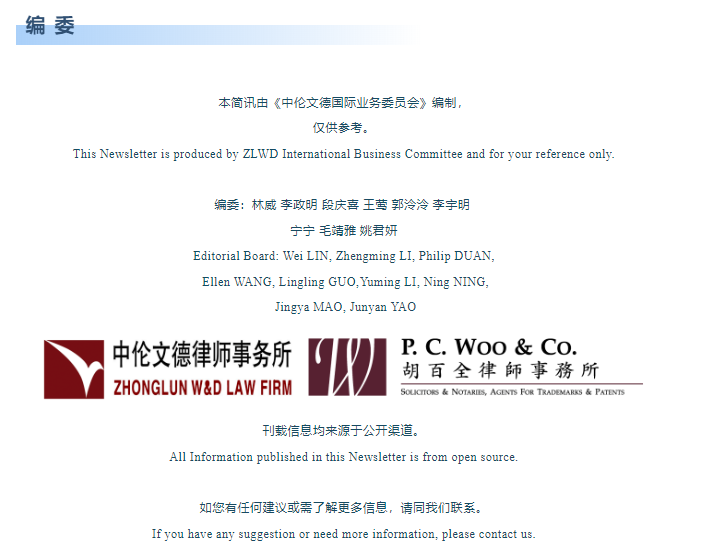
NEWS

NEWS

First Foreign Arbitration Institution in China to Set Up Operations in Shanghai Approved for Registration
On November 22, 2023, the 8th session of the 16th Shanghai Municipal People's Congress Standing Committee voted to pass the "Regulations on the Promotion of the Construction of the Shanghai International Commercial Dispute Resolution Center" (hereinafter referred to as the "Regulations") , which is the first local regulation in the country governing the establishment of an international commercial dispute resolution center. Article 16 of the "Regulations" stipulates that well-known overseas arbitration and dispute resolution institutions can establish business operations in the city, register with the municipal justice administrative department, and file records with the State Council's justice administrative department to engage in foreign-related arbitration business in international commercial, maritime, investment, and other fields.
On December 1, 2023, the "Regulations" officially took effect. On the same day, the Shanghai Municipal Bureau of Justice made a decision to register the Shanghai Center of Korean Commercial Arbitration Board (hereinafter referred to as the "Shanghai Center of KCAB") and, within the stipulated period, submitted the registration to the Ministry of Justice, obtaining a registration certificate for the business operation of an overseas arbitration institution. The Shanghai Center of KCAB will be the first business institution established in Shanghai by a foreign arbitration institution following the first international organization's arbitration institution (the World Intellectual Property Organization Arbitration and Mediation Center in Shanghai).
The Korean Commercial Arbitration Board (KCAB), established more than 50 years ago, is the only statutory permanent commercial arbitration institution in Korea. After registering with the Shanghai Municipal Bureau of Justice and reporting to the Ministry of Justice for the record, the Shanghai Center of KCAB is able to carry out foreign-related arbitration business in respect of civil and commercial disputes arising in the fields of international commerce, maritime affairs, investment, etc. The scope of its business includes: acceptance of cases, hearings, hearings and awards; case management and services; and business consulting, guidance, training and seminars.
First Case: Shanghai Court Issues Investigation Order on Application of Arbitration Institution
On November 22, 2023, the 8th session of the 16th Shanghai Municipal People's Congress Standing Committee voted to pass the "Decision of the Standing Committee of the Shanghai Municipal People's Congress on Amending the 'Shanghai Municipality Optimizing Business Environment Regulations'" (hereinafter referred to as the "Decision"). Accordingly, Shanghai courts will establish mechanisms to support the issuance of investigative orders for arbitration cases. In alignment with the spirit of the "Shanghai Municipality Optimizing Business Environment Regulations" (hereinafter referred to as the "Regulations"), the Shanghai High People's Court promptly introduced the "Measures of the Shanghai High People's Court on Issuing Investigative Orders to Assist Arbitration Investigation and Evidence Collection (Trial Implementation)" (hereinafter referred to as the "Measures"), providing guidance for local courts in issuing investigative orders to assist in arbitration investigation and evidence collection.
On December 1, 2023, the Minhang District People's Court of Shanghai (hereinafter referred to as the "Minhang Court") processed the first case of a court issuing an investigative order upon an arbitration institution's application, marking the inaugural day of the implementation of the "Decision" .
The case handled by the Minhang Court exemplifies the active implementation of the "Regulations" and the requirements of the "Measures", demonstrating judicial support for arbitration and contributing to the proactive practice of optimizing the business environment. This instance remains the first of its kind nationwide in promoting this alignment between arbitration and judicial support, thereby optimizing the business environment.
High Court of Hong Kong Issues First Judicial Assistance Request Letter to Xiamen Bankruptcy Court
On 23 November 2023, the High Court of Hong Kong granted for the first time a letter of request for judicial assistance to the Xiamen Bankruptcy Court.
The Court of First Instance of the High Court of Hong Kong, examined the circumstances of the case under the co-operation mechanism for recognising and assisting insolvency proceedings between Hong Kong and the China as follows:
First, the company in question had been in creditors' voluntary liquidation since 15 June 2023, which was a "Hong Kong insolvency proceeding" under the Supreme Court's Pilot Scheme on Recognition and Assistance in Bankruptcy Proceedings in the Hong Kong;
Secondly, the applicant was the liquidator of the company in question;
Thirdly, the Xiamen Bankruptcy Court, whose recognition and assistance was sought, was one of the pilot courts in China;
Fourthly, the order sought was to recognise the liquidator's status and to assist him in the performance of his duties as liquidator of the company;
Fifthly, the company in question was a Hong Kong company and its main central interests had been in Hong Kong for more than the six months required under the BIPO mechanism;
Sixthly, the principal assets of the company were subsidiaries established in China, all of which were set up in Xiamen with their offices located in Xiamen.
Seventh, the MLA request letter, as amended and approved by the Court, sets out in detail the duties of the liquidator; the proposed approach to the Xiamen Bankruptcy Court to seek recognition and assistance in discharging its duties as liquidator; and the facts and reasons why the liquidator needs to take control of the four subsidiaries.
Eighth, under the circumstances and facts of this case, it was necessary for the liquidator to seek the approval and assistance of the Xiamen Bankruptcy Court in order to be able to take control of the four subsidiaries of the company in question.
In summary, in the circumstances of this case, it was necessary for the High Court of Hong Kong to exercise its discretion to request the Xiamen Bankruptcy Court to recognise the creditor's voluntary liquidation of the company and to assist the liquidator to provide assistance in accordance with the terms set out in the letter of request for judicial assistance.
Shanghai Second Intermediate People's Court:
An application to set aside an arbitration conciliation letter or an arbitral award made under a settlement agreement on the grounds of article 58, paragraph 1, of the Arbitration Law shall not be supported, except where it is in violation of the public interest
Legal Basis:
"The Arbitration Law of the People's Republic of China"
Article 58
Where the parties concerned can provide evidence disproving the arbitration award in any of the following circumstances, they may request a cancellation of the arbitration award by an intermediate People's Court at the place where the arbitration commission is located:
(1) there was no arbitration agreement;
(2) items for arbitration were not within the scope of the arbitration agreement or were those upon which the arbitration commission had no right to arbitrate;
(3) the establishment of the arbitration tribunal or arbitration procedures are in contravention of legal proceedings;
(4) the evidence upon which the arbitration award is made was counterfeit;
(5) the other party has concealed evidence to the degree that fairness has been affected;
(6) arbitrators have accepted bribes, resorted to deception for personal gain or perverted the course of justice by the award.
Where the People's Court has formed a collegiate bench and has examined and verified that the award was made under one of the aforesaid situations, it shall order the cancellation of the award.
Where the People's Court decides that it should make a ruling to the effect that there has been a violation of the public interest, it shall order the cancellation of the award.
Case Description:
In March 2022, Taipingguofa Hehe (Beijing) Investment Management Co., Ltd. (hereinafter referred to as "Taipingguofa Company") filed for arbitration with the Shanghai International Economic and Trade Arbitration Commission (Shanghai International Arbitration Center) (hereinafter referred to as "Shanghai CIETAC") against Hangzhou Baijia Hospital Management Co., Ltd. (hereinafter referred to as "Baijia Company"), Su, Lin, Xu, Weng, Lin, Yang (hereinafter collectively referred to as the "Seven Applicants"). On October 12, 2022, the Shanghai CIETAC Secretariat received separate applications and a "Settlement Agreement" from Taipingguofa Company and the Seven Applicants, requesting the Director of Shanghai CIETAC to appoint an arbitrator for a written hearing. On November 3, 2022, the arbitration tribunal rendered [2022] No. 1236 HMTAC Arbitration Ruling (hereinafter referred to as the "Arbitration Ruling").
On March 2, 2023, the Seven Applicants applied to the Shanghai Second Intermediate People's Court (hereinafter referred to as the "Court") to annul the Arbitration Ruling. They argued that the "Capital Increase and Share Expansion Agreement" stipulated Baijia Company's (the target company) repurchase obligation, and the Arbitration Ruling, which ordered Baijia Company to fulfill the repurchase obligation and pay Taipingguofa Company for share repurchase, violated mandatory provisions of Company Law, thus rendering it invalid. They claimed that the Arbitration Ruling might harm the interests of other shareholders and creditors of Baijia Company, disrupt normal market transactions, and contravene public interests, shall be set aside.
Taipingguofa Company countered, asserting that the "Capital Increase and Share Expansion Agreement" established Baijia Company's right to repurchase shares, compliant with legal regulations, and the arbitration ruling was based on mutual application in accordance with the "Settlement Agreement," not conflicting with public interests, thus should not be set aside.
Court’s View:
Regarding whether an arbitration ruling based on a settlement agreement between the parties can be annulled, the court offered the following points:
Firstly, arbitration rulings based on settlement agreements between parties bear the same nature as arbitration mediation agreements. The court explicitly distinguishes this category of arbitration rulings from general arbitration rulings.
Secondly, Article 58, paragraph 1 of the Arbitration Law of the People's Republic of China (hereinafter referred to as the "Arbitration Law") does not expressly encompass arbitration mediation agreements or arbitration rulings based on settlement agreements between parties. Considering the principle of limited judicial review in arbitration judicial supervision, in cases where the law doesn't specify the inclusion of arbitration mediation agreements or arbitration rulings based on settlement agreements between parties, the court should not exceed legal provisions to conduct reviews.
Thirdly, aligning with relevant provisions in the Civil Procedure Law of the People's Republic of China and the Arbitration Law, the grounds for applying to annul an arbitration ruling by the parties largely coincide with those for refusing to enforce an arbitration ruling. According to Article 17 of the Supreme People's Court's provisions on handling enforcement cases of arbitration rulings, if the arbitration mediation agreement or arbitration ruling based on a settlement agreement or mediation agreement violates public interests, the court will not support it.
Therefore, when a party applies for the annulment of an arbitration mediation agreement or an arbitration ruling based on a settlement agreement between the parties under Article 58, paragraph 1 of the Arbitration Law, the court should not review it directly. However, if a party claims that it violates public interests, the court should examine whether the arbitration mediation agreement or arbitration ruling based on the settlement agreement between the parties indeed contravenes public interests and make a determination.
Regarding whether the involved ruling violates public interests, on one hand, China's Company Law does not prohibit target companies from repurchasing shares; instead, it provides specific provisions governing such repurchases. Whether Baijia Company meets the conditions for repurchase is a substantive issue and lies beyond the scope of this court's judicial review. On the other hand, even if Baijia Company fails to meet the repurchase conditions, the contractual clause on share repurchase in question only affects the interests of Taipingguofa Company and Baijia Company, not public interests. Therefore, the involved ruling does not violate public interests. The Seven Applicants' application for annulment of the arbitration ruling based on this reason lacks support from this court.
In conclusion, in accordance with Articles 58 and 60 of the Arbitration Law of the People's Republic of China, the Second Intermediate People's Court of Shanghai ruled to reject the application by Hangzhou Baijia Hospital Management Co., Ltd., Su, Lin, Xu, Weng, Lin, Yang to annul [2022] No. 1236 HMTAC Arbitration Ruling.
Ontario Superior Court of Justice: First Recognition and Enforcement of Xiamen Arbitration Commission Award
Case Description:
On February 6, 2020, Xiamen Guomao Group Co., Ltd. (hereinafter referred to as the "Applicant") and Canada's LinkGlobal Food Inc. (hereinafter referred to as the "Respondent") signed a sales contract (hereinafter referred to as the "Contract"), providing that the Applicant would purchase protective masks from the Respondent for the purchase price of US $532,224.00. Article 6 of the Contract was an arbitration clause, agreeing that disputes would be submitted to the Xiamen Arbitration Commission for arbitration settlement. The applicable law of the contract was Chinese law.
On January 13, 2021, the Applicant initiated arbitration against the Respondent with the Xiamen Arbitration Commission, pursuant to Article 6 of the contract, claiming that the protective masks sold by the Respondent had expired and were unusable. The Applicant demanded a refund for the purchase price of the masks and compensation for various expenses incurred. On September 1, 2021, the arbitral tribunal rendered a unanimous decision (hereinafter referred to as the "Arbitration Award"), ordering the respondent to refund the purchase price, along with interest, customs duties, shipping costs, legal fees, arbitration expenses, etc., within 10 days of the service of the Arbitration Award. However, the respondent neither complied with the Arbitration Award nor applied for its annulment.
On October 26, 2022, the Applicant applied to the Ontario Superior Court of Justice (hereinafter referred to as the "Ontario Superior Court") for the recognition and enforcement of the Arbitration Award. The Ontario Superior Court set various deadlines for submissions, responses, and cross-examinations, and eventually scheduled November 15, 2023, as the trial date. The Respondent failed to adhere to these deadlines and sought an extension. The reason cited was that the Respondent's counsel, Lawyer An, had highlighted flaws in the arbitration process and procedure, intending to use this as a defense against recognition and enforcement. However, due to Lawyer An's reluctance to provide witness testimony on this matter, the Respondent's Canadian counsel suggested engaging another Chinese lawyer in China to litigate against Lawyer An, compelling the production of evidence and summoning him as a witness.
Court’s View:
The Respondent's request for an adjournment is denied.
First, even though the Respondent has known about this Application for almost a year, it does not currently have evidentiary support for any valid ground to oppose the enforcement of the Arbitration Award. No explanation has been provided for this lack of diligence. The conduct of the Respondent in this case also undermines two of the factors listed above: the need of the administration of justice to orderly process civil proceedings, and the need of the administration of justice to effectively enforce court orders, here, scheduling orders.
Second, the affidavits of Respondent's counsel filed in support of the request for an adjournment are largely based on hearsay. In the absence of any evidence from the Respondent, an adverse inference should be drawn.
Thirdly, although the Respondent's counsel wished to adjourn the hearing in order to obtain certain evidence to raise defences. However, most of the grounds for non-enforcement of the award raised by the respondent's counsel were substantive issues that had already been accepted, considered and decided by the Xiamen Arbitration Commission. There was no evidence in the arbitral award that the parties had not been treated equally in terms of their participation in the arbitral tribunal hearings. The allegations made by the Respondent at the hearing that the Xiamen Arbitration Commission lacked independence were purely speculative.
Given that the extension will cause significant delays and the uncertainty regarding the respondent's ability to compel Lawyer An to provide evidence in this proceeding. Delay has an impact on the administration of justice. There is a strong public interest in promoting the timely resolution of disputes. Respondent has an undue interest in delaying this application. Failure to enforce timelines frustrate the legitimate expectations of the parties. The Respondent's request for an adjournment, the limited and last-minute evidence filed in support of the request, and the fact that more than two years after the Arbitration Award was delivered and almost one year after the Application was scheduled the Respondent does not appear to know what its defence is going to be, suggest a party who is grasping at straws to avoid its payment obligations under the Award.
In conclusion, the Ontario Superior Court of Justice ruled in the Respondent's application for an extension of time should be rejected and the recognition and enforcement of the Xiamen Arbitration Commission's Arbitration Award should be granted.


